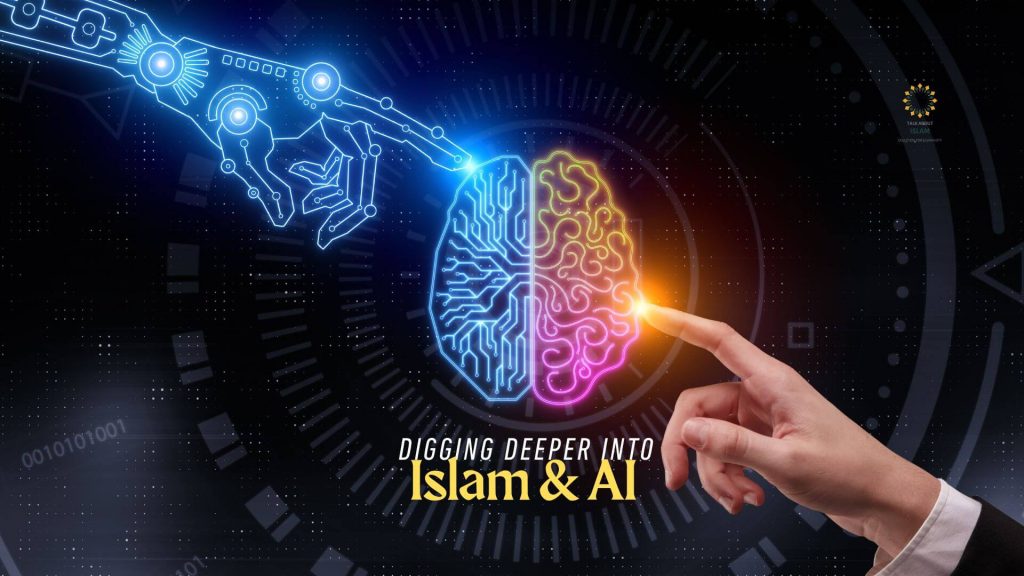Artificial Intelligence (AI) is no longer a distant idea. It suggests the next video we watch, helps doctors read scans, and powers the tools we use at work. With so much change, many people ask: How should Muslims think about AI? Islam offers timeless guidance for new questions. It welcomes knowledge and innovation, but it also sets boundaries to protect justice, human dignity, and compassion. This article explores AI’s promise and its risks through a simple, practical Islamic lens.
What Is AI, Simply?
AI is a branch of computer science that allows machines to perform tasks that usually require human intelligence, such as recognizing patterns, understanding language, making predictions, and sometimes creating new content. It learns from data. The more high-quality data it receives, the better it can perform. Common examples include voice assistants, translation apps, medical image analysis, navigation, and chatbots.
Islam’s View of Knowledge and Innovation
Islam encourages seeking knowledge and solving real problems. The Qur’an repeatedly invites humans to think, observe, and learn. At the same time, knowledge in Islam is never just for pride or profit, but it serves human good. The believer is a steward (Khalifah) on Earth who is responsible for using tools in ways that uplift people and protect the world. That mindset applies directly to AI.
Ethical Boundaries from an Islamic Lens
Artificial Intelligence is powerful, but power without guidance can harm. The following principles help set clear limits.
Justice
Islam places justice at the center. If an AI system treats some groups unfairly, such as by race, gender, language, or income, it violates this principle. Bias often hides in data. Developers and leaders must test systems, ask hard questions, and fix unfair outcomes. A just tool is transparent and accountable.
Human Dignity
Every person has dignity. AI must not reduce people to numbers or targets. Systems that manipulate emotions, shame users, or harvest personal data without consent undermine dignity. Therefore, Islam largely emphasizes consent, privacy, and clarity.
Responsibility
Technology is a trust, while designers, companies, and governments are responsible for the harm their systems can cause. “It was only the algorithm” is not an excuse. Humans choose the goals, select the data, and deploy the tools. Islam encourages them to be answerable for results.
Balance
Innovation should be balanced with care. A faster, cheaper AI is not automatically better. A balanced approach measures benefits against harms: job loss, surveillance, environmental impact, and misinformation.
Avoiding Harm
If a use of AI creates clear harm, such as exploitation, deception, dangerous deepfakes, or tools that escalate violence, it should be restricted or rejected. Islamic ethics prefers prevention to cure; we do not wait for damage if the risk is obvious and serious.
AI at Work: Dignity of Labor and Livelihood
Automation can make work safer and more productive, but it can also displace jobs. Islam respects the dignity of work and the right to a lawful livelihood. When companies adopt AI, they should also invest in training, reskilling, and fair transitions. Leaders should design AI to assist, not just replace, and to open new paths for meaningful employment. Communities and governments can support this with education and safety nets.
AI and Privacy: A Moral Red Line
Modern life generates oceans of personal data, including location, habits, voice, and face. Islam protects privacy and forbids spying. AI systems built on constant surveillance threaten trust. Ethical use requires clear consent, strong security, and limits on how long data is kept. Anonymous or small data approaches should be preferred when possible. Families and schools can model this by setting good practices: private accounts, minimal sharing, and careful app permissions.
Misinformation, Deepfakes, and Truthfulness
AI makes it easy to create realistic fake content. Islam values truthfulness and warns against spreading rumors. We should slow down before sharing, verify sources, and use fact-checking tools. Platforms and developers should label synthetic media and give users ways to trace content to its source. The goal is not to fear technology, but to defend the public space where truth can breathe.
AI in War and Policing: Lines We Should Not Cross
Weapons that select targets without human judgment raise grave concerns. Islam sets rules in war to protect civilians, show restraint, and avoid cruelty. Fully autonomous weapons and mass surveillance systems that treat communities as suspects threaten these principles. Any use of AI in security should include human oversight, strict limits, and public accountability.
Using AI for Personal Growth, Not Distraction
On a personal level, AI can help us organize tasks, learn languages, and manage time. However, it can also feed endless entertainment. The same device can pull us closer to purpose or push us away from it. Islam encourages the following habits:
- Set a clear intention before opening an app: “I am here to learn X for 20 minutes.”
- Use timers to end sessions on time.
- Replace empty scrolling with Remembrance of Allah, reading, or exercise.
- Keep devices outside the bedroom to protect sleep and morning prayer (Salah).
A Simple Framework for Islamic AI Ethics
When evaluating an AI system, apply four steps:
- Intention (Niyyah): Is the goal noble and useful?
- Means: Are the methods lawful and respectful (data, design, deployment)?
- Consequences: Who benefits, who might be harmed, and how do we reduce that harm?
- Accountability: Who is responsible, and how will they answer for misuse or mistakes?
Looking Ahead: Hope with Guardrails
AI will keep advancing, and it should not frighten us. Guided by faith, we can welcome tools that heal, teach, and connect, while saying no to systems that exploit, divide, or erase privacy. The path forward is not rejection or blind adoption, but wise use.



